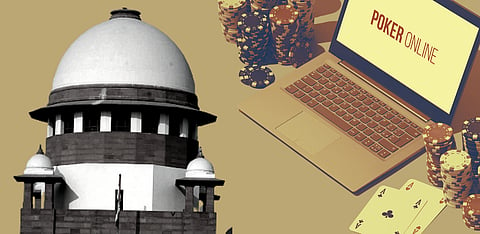

In its appeal in the Supreme Court, it invokes several legal grounds to challenge High Court verdict striking down its ban on online gambling
———-
THE Karnataka government has moved the Supreme Court challenging a Karnataka High Court judgment that struck down a state law that prohibited betting on online games.
On February 14, the Karnataka High Court struck down provisions of the Karnataka Police (Amendment) Act, 2021 that prohibited and criminalized online gambling and betting.
The Karnataka Police (Amendment) Act, 2021, effected in October 2021, had banned all forms of wagering or betting, except for lottery and horse racing. Specifically, the amendment criminalizes the following:
Violation of these provisions could have resulted in a maximum imprisonment of three years and a penalty up to one lakh rupees.
By way of the February decision, the Act was struck down.
According to the appellants, the high court had gravely erred in not recognizing the state government's power to draft the Amendment Act.
"[T]he Hon'ble High Court gravely erred in not appreciating the fact that the state government is empowered to enact the Karnataka Act No. 28/2021 (Amendment Act) by virtue of Entry-1 (public order), Entry- 2 (Police), Entry-26 (Trade and Commerce) in List II of Schedule VII of the Constitution of India."
The state government further argued that the Amendment Act was quite essential to maintain public peace and order. Several families were affected because of betting and wagering, the government maintained.
The state government contended:
"[T]he Hon'ble High Court gravely erred in not noticing the fact that the Amendment Act was necessary for maintaining public order and public health, specifically having regard to the fact that menace of cyber-crime had reached epic propositions and police authorities, in the three years have registered about 28,000 cases all over the state of Karnataka. Several persons have committed suicide and millions of families have been ruined as a result of online gaming."
Therefore, the Amendment Act, which criminalized wagering, betting, or risking money on the unknown result of an event was definitely required to deal with the "evolving situation arising from the ill-effects of online gaming", the state government argued.
The Karnataka High Court also failed to notice that the Amendment Act did not ban games of skill and that there are various misleading websites that prompt the public to part with large sums of money, the state government pointed out.
Also, the court did not consider the intent and purpose behind amending the Karnataka Police Act, 1963, the petition mentioned.
In the present matter, the high court had failed to apply the 'proportionality test' without noticing the settled proposition of law, the state government submitted.
Further, it was contended that the high court was wrong in not applying the settled position of law which says that 'presumption is always in favour of the constitutionality of the statute'. The court had not checked if the petitioners had proved whether the enacted statute was excessive and not proportionate to the evil sought to be remedied, the state government argued in its petition.
The court also failed to note that government interference would be there only for the regulation of online games and not for games such as horse racing, it has been argued.
The state government has further pointed out that it was wrong on the part of the high court to opine that the government will have to undertake suitable study and research before coming up with a legislation.
The state government also highlighted the problems in the high court's finding that online games do not have a "demonstrable effect" in causing excessive, immediate, or discernible harm to others.
On these grounds, the Karnataka government has sought the setting aside of the Karnataka High Court's February 14 judgment.